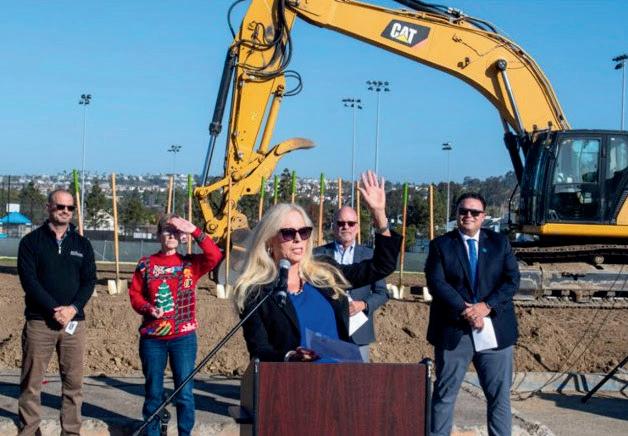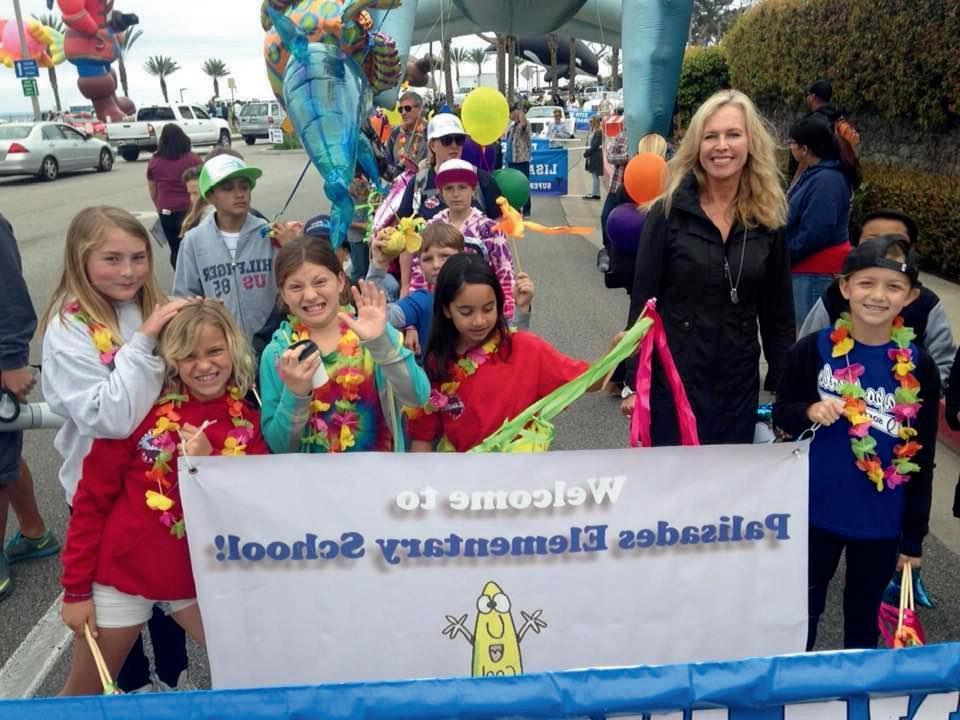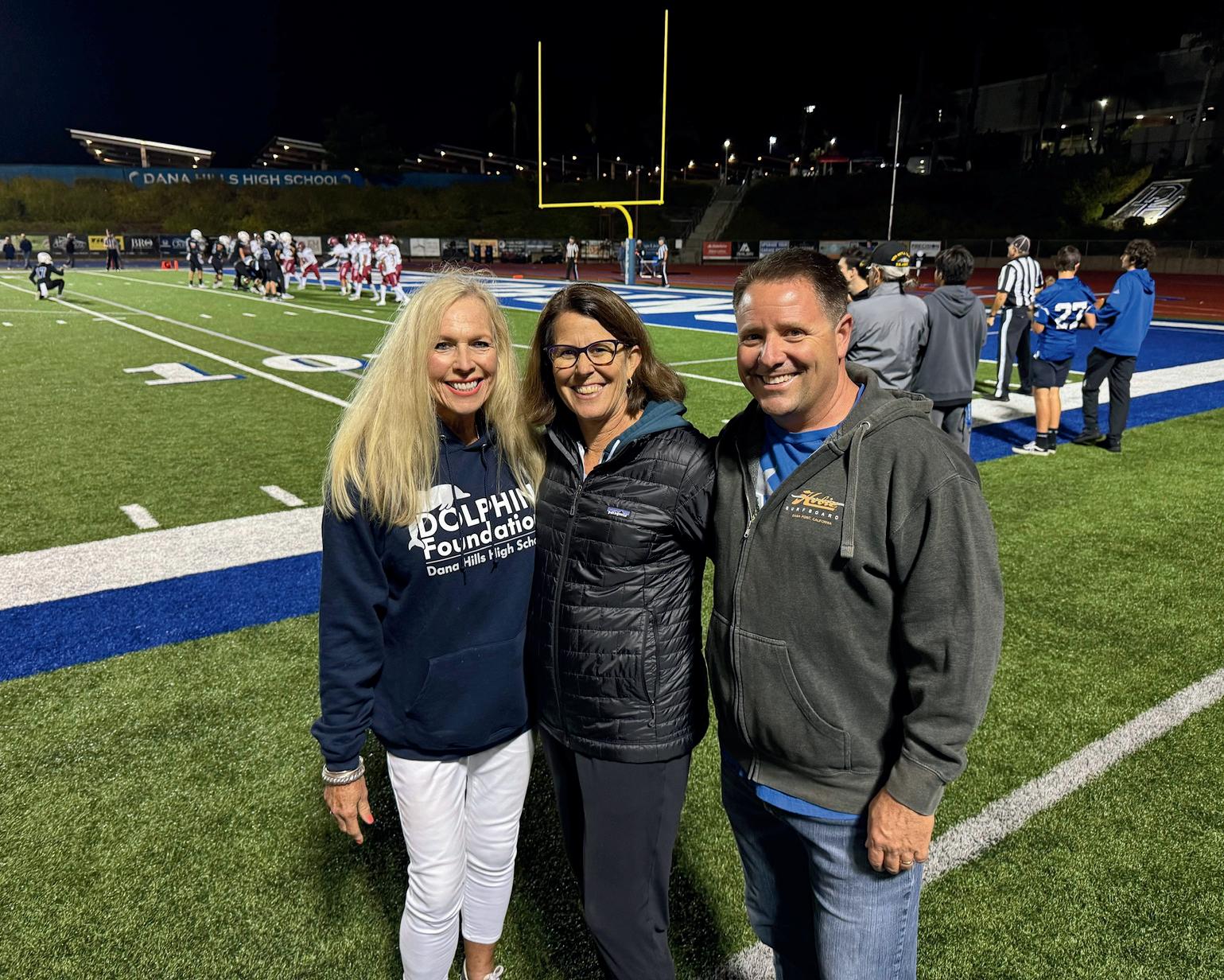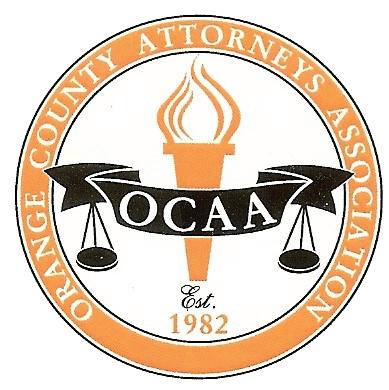Election 2024





By Angélica Escobar
As the race for the California 74th Assembly District intensifies, two candidates from South Orange County are laying out their visions to address the key issues facing their district: current San Clemente City Councilmember Chris Duncan and incumbent Assemblymember Laurie Davies.
Duncan, a longtime San Clemente resident and former mayor, is campaigning on improving representation for his district in Sacramento. His priorities include public safety, cost-ofliving concerns, homelessness, and coastal protection, ensuring that local tax dollars are spent on community needs like sand replenishment and bluff stabilization.
Duncan emphasizes public safety, noting that San Clemente relies on the Orange County Sheriff’s Department for police services. He played a pivotal role in hiring Chief of Police Services Jay Christian and supports adding more deputies and code compliance officers to maintain cleanliness in parks and beaches.
“I was proud to be the councilmember and mayor who advocated for adding four more deputy sheriffs, which we successfully implemented. I also played a key role in adding more code compliance officers, specifically park rangers, to keep our parks and beaches clean,” Duncan said.
Addressing homelessness is another of Duncan’s priorities. Instead of accepting temporary state funding for emergency solutions, he chose to hire outreach workers, aiming to build trust with the homeless community and focus on long-term solutions, such as supportive housing with mental health services.
“We want to address the long-term causes of homelessness, and that’s what our homeless outreach team was empowered to do, and that’s what they did. And so I’m proud that we were able to make that progress,” Duncan said.
As a board member of the Orange County Fire Authority, Duncan has also advocated for additional resources, including new firefighting helicopters, to ensure adequate attention is given to South Orange County’s wildfire risks.
“I have ensured that San Clemente receives its fair share from the fire service and fought for greater wildland protection. Most recently, I authorized the purchase of two new fire helicopters that deliver water to combat fires,” he said.
Duncan is a vocal advocate for women’s reproductive rights, standing against efforts to limit such services in San Clemente.
“I proudly stood with residents from all walks of life to fight back against a previous attempt by some extreme City Councilmembers to outlaw women’s reproductive services and Planned Parenthood in our community. It’s vital to ensure that no extremist resolution that undermines women’s rights ever gets on our agenda again,” he said.
In contrast, Duncan accuses his opponent, Laurie Davies, of supporting a nationwide abortion ban. “Laurie Davies supported a nationwide abortion ban, even in cases of rape and incest, which contradicts community values of freedom and choice,” Duncan said.
Davies, first elected to the Laguna Niguel City Council in 2012 and later serving as its mayor, is focusing her campaign on keeping prices affordable and neighborhoods safe. Elected to the California State Assembly in 2020 and reelected in 2022, she has called for significant tax reforms, including the removal of the gas tax, an issue she says resonates with many residents.
“I think No. 1, we want to make sure that we can go ahead and get rid of the gas tax. ... I had voted on that six times on the floor, and unfortunately, they voted to the super majority to not even have it voted on,” Davies said. Davies advocates for providing tax credits to renters, particularly seniors on fixed incomes, and insists that such measures can be implemented without negatively affecting the state budget.
“I really believe that we need to provide a tax credit to renters, especially for our seniors who are on a fixed income. There are common-sense methods we can implement that won’t be detrimental to the rest of the state,” she said.
Davies also stresses the need for accountability in state spending, particularly on homelessness. She co-authored a measure that revealed $25 billion was spent on homelessness without producing clear results. “They came up and said, ‘We understand now that the audit revealed an increase in homelessness, but they were never held accountable,’ “ she said.
Additionally, Davies criticizes Gov. Gavin Newsom for cutting funding for firefighter mitigation efforts and has consistently supported legislation aimed at bolstering law enforcement resources and mental health services for first responders. “We need to ensure our police have the support they need to keep our neighborhoods safe,” Davies said.
When discussing homelessness, Davies highlights compassion and understanding as crucial elements. She emphasizes the importance of training law enforcement and social workers to effectively identify and assist individuals with conditions such as autism or mental illness, fostering a supportive environment that encourages trust.
“I think that the key thing is compassion, compassion and understanding,” she said, describing her support for a homeless task force that works with social workers.
Reflecting on her time serving the 74th Assembly District, Davies expressed deep gratitude for the opportunity to represent her community and underscored her commitment to bipartisanship. She pointed to her A rating on her voting record and encouraged constituents to visit her website for accurate information, refuting claims from her opponent. She also discussed personal challenges, including her absence due to her mother’s illness, while stressing that her legislative achievements—23 bills signed into law, all focused on enhancing safety and reducing the cost of living—speak for themselves.
“My opponent tends to lie or mislead people when it comes to the things that he’s saying about me. So when it comes to my voting record, I have an A voting record, and he knows that I had an excused absence because my mother was dying, and so I needed to leave,” Davies said.
As the election approaches, voters in San Clemente face a significant decision, weighing each candidate’s approach to public safety, housing, and community well-being. Duncan calls for change and a focus on local needs, while Davies emphasizes her experience and commitment to addressing California’s challenges.
The 74th Assembly District includes San Clemente, Dana Point, Laguna Niguel and San Juan Capistrano in South Orange County, down through Camp Pendleton, Oceanside, Vista and part of Fallbook in North San Diego County.







“Amy

Paula
By Kaila Mellos
MIn the Nov. 5 San Juan City Council election, the seat is open in District 1 for voters to choose who they want to see represent their district. Sergio Farias, the current mayor and District 1 representative, and businessman Jesse “Chip” Nelson are on the ballot.
Farias has been on the City Council since December 2016 and has twice been elected mayor of the San Juan Capistrano. Born and raised in San Juan, he is deeply committed to elevating all residents’ living standards, regardless of their background or economic status.
Nelson is the CEO of Empower Renewable Energy Development, Inc., a green energy company committed to reducing carbon emissions and providing environmentally responsible sustainable energy solutions. Nelson is also a licensed general and electrical contractor in multiple states and is a certified IT System Engineer and Trainer.
Both were asked two questions in an effort to inform San Juan Capistrano residents about what to expect if they were elected to office.
What are your main goals for the upcoming election, and what are some focus areas for your campaign?
Farias: “I am eager to share my accomplishments for District 1 over the last eight years. Under my leadership, we’ve achieved major improvements: better roads, bike lanes, safer sidewalks, increased law enforcement, enhanced parks, expanded trolley service, and a new City Hall—all without new debt. As mayor, I also led the passage of a citywide moratorium on battery storage projects. Given the proposed site’s environmental concerns, I’m committed to protecting our natural resources and safeguarding residents from potential project impacts.”
Nelson: “As a candidate for City Council, I have many goals, but my three main efforts are centered around these key issues: First, addressing and taking all actions possible to prevent the controversial battery energy storage installation proposed in District 1. This is a major concern for our community and as a builder of renewable energy systems myself, I know this proposed location is unfit and unsafe due to the toxic gas plume exposure that will expose nearby homes during a lithium battery fire. Second, I’m committed to preventing irresponsible overdevelopment in San Juan Capistrano. We need to preserve our town’s charm while making thoughtful decisions about growth. Taking the stance that things are out of our hands and we are helpless because the state of California says so on
certain topics is unacceptable to me. Finally, public safety should always be a top priority for anyone in public office. Everyone should feel safe in their home and neighborhoods. I will work to strengthen our public safety agencies while fostering community-driven solutions for people experiencing homelessness and public hazards.”
What are you hoping to keep the same or change if elected to represent District 1?
Farias: “I’m proud to have fostered civility, increased resident participation, and transparency in our public meetings through my current tenure on City Council. But if I had to highlight one project, it’d be the Groves Senior Apartments. This development addressed a critical housing need, prioritized local residents, and enhanced the area with architecture that complements our town. I deeply value seeing multi-generational families thriving in my hometown, just as my own three generations do in District 1. Ensuring the safety and quality of life for all residents is paramount. While I also highlight that, I would like to say we have enhanced safety with increased law enforcement, attracted high-paying jobs, improved parking access, revitalized the Sports Park, and initiated the Skatepark Project. When re-elected, I’ll prioritize completing the Skatepark, investing in roads, preserving open spaces, and ensuring public safety remains paramount. Let’s continue building a thriving District 1 together.”
Nelson: “My goal is to strike a balance between preservation and progress, which is a challenge throughout our city. District 1 has so much character, and I want to protect what makes it special. But at the same time, we must address challenges like housing, infrastructure, and safety in a smart and responsible way. I’m committed to managing growth so that we don’t lose what makes District 1 unique, but we also ensure it evolves to meet the needs of our future generations. District 1’s high density apartment and townhome communities have inadequate parking availability that cause significant negative impacts to those residents’ quality of life. I am aware that solving all of the parking issues overnight is not possible, but there are some immediate solutions that could be put in place to provide some short-term relief to those residents while larger solutions are being evaluated. As a City Council candidate, I have already met in person with many of these affected residents and HOAs on this topic and heard their struggles. They are frustrated and feel that their concerns are not being taken seriously at the district level. I want to try to do better for them than what they are currently getting. The Northwest Open Space is an area that adds charm to District 1. The early leadership of our community took action to preserve it as open space. A short time ago, our city put out a request for proposals for a private party to develop the area into something other than natural land. This process needs to be watched carefully to ensure that the open space is, in fact, kept open and accessible to all.”
By Angelica Escobar
With the election season in full swing, California voters will have a unique opportunity to fill a Senate seat by selecting both a short-term and longterm successor to the late Sen. Dianne Feinstein. The candidates on the ballot are Rep. Adam B. Schiff, a Democrat from Burbank, and former Dodgers All-Star Steve Garvey, a Republican from Palm Desert. They will compete in two separate elections: one to complete Feinstein’s term, which ends in early January, and another for a full six-year Senate term.
This election marks the first U.S. Senate race in California without an incumbent since 2016, when Kamala Harris secured the seat previously held by retiring Sen. Barbara Boxer. Harris served four terms and is now running for President.
Following Harris’ swearing-in as Vice President in 2021, Gov. Gavin Newsom appointed Alex Padilla to take her place. Padilla later won a full six-year term in 2022. Regardless of whether Schiff or Garvey wins, California will be without a female senator for the first time in a generation.
Schiff, 64, has represented Los Angeles and the San Gabriel Valley for nearly 30 years. He rose to national prominence during the impeachment trials of former President Trump, particularly through his role on the January 6 committee investigating the alleged conspiracy to overturn the 2020 election. His actions have attracted both praise and criticism, culminating in a censure from House Republicans in 2023, who accused him of misleading Congress regarding alleged collusion between Trump’s 2016 campaign and Russia. Schiff regards the censure as a “badge of honor.”
Garvey, 75, is better recognized for his baseball career than his political endeavors. A standout first baseman for the Dodgers during the 1970s and 1980s, Garvey won a World Series title in 1981 and was a 10-time National League All-Star. Running as a first-time candidate, he presents himself as a “moderate conservative.” Despite a pristine public image, his personal life has been scrutinized due to past controversies and ongoing financial issues, including substantial unpaid debts and back taxes.
By Angélica Escobar
In the race for California’s 49th Congressional District, Republican Matt Gunderson and Democrat Mike Levin bring distinct backgrounds and priorities to the forefront.
Gunderson is a businessman and resident of Ladera Ranch who has founded three auto dealerships in Mission Viejo, creating over 200 local jobs. He emphasizes strengthening the economy, drawing on his business experience to address wages, inflation, and the rising costs of housing, gas, and groceries. His campaign focuses on key issues, including supporting term limits for Congress members to bring fresh perspectives to Washington.
Gunderson advocates for repealing the gas tax hike, halting the proposed mileage tax, and maintaining Proposition 13 to limit property-tax increases for homeowners. He also prioritizes border security, aiming to address concerns related to drug trafficking, crime, and national security. Furthermore, he supports safeguarding Social Security and Medicare for seniors, improving the Department of Veterans Affairs for veterans, and maintaining access to reproductive health services, including abortion and fertility treatments such as IVF.
Gunderson’s approach to crime includes supporting law enforcement while ensuring accountability. He has proposed a plan to address homelessness by offering treatment for those in need and managing public spaces. Residing in Ladera Ranch for 25 years with his wife and four daughters, Gunderson remains actively engaged in the local community.
Mike Levin, the incumbent Congressman representing California’s 49th Congressional District, brings a different perspective to the race. Raised in South Orange County by a Mexican-American mother and a Jewish-American father, Levin attended local public schools and graduated from Stanford University, where he served as student body president. He earned his law degree from Duke University.
Before his election to Congress in 2019, his first of three terms, Levin served as Executive Director of the Democratic Party of Orange County, supporting political campaigns and community initiatives. He also worked as an attorney specializing in environmental and energy law and co-founded Sustain OC, promoting sustainable practices in the region.
In Congress, Levin collaborates with members from both parties on various issues, including lowering costs for families, fostering innovation and job creation, and ensuring public safety while addressing border security and immigration. He advocates for freedom from gun violence, for women’s rights, and for the protection of health care and veterans’ services.
Levin is also committed to environmental protection, including efforts to remove spent nuclear fuel from San Onofre and strengthen Social Security and Medicare. His focus extends to education, pandemic preparedness, LGBTQ+ equality, and housing and homelessness. He opposes toll road extensions through South Orange County. Levin lives in San Juan Capistrano with his wife, Chrissy, and their two children.
As the election approaches, Gunderson and Levin present contrasting visions for the future of the 49th Congressional District, making this race a pivotal one for local voters.
The 49th District includes North San Diego County and parts of South Orange County, including the cities of Dana Point, San Clemente and San Juan Capistrano.

By Breeana Greenberg
Residents in South Orange County will decide which of two candidates will represent their areas on the Capistrano Unified School District Board of Trustees.
Four seats are up for grabs in Areas 1, 2, 3 and 5 during the Nov. 5 general election.
Voters will decide between these candidates:
Area 1: Amy Hanacek (incumbent) or Jennifer Adnams
Area 2: Michael Parham (incumbent) or Lisa Zollinger
Area 3: Lisa Davis (incumbent) or Sherine Smith
Area 5: Krista Castellanois (incumbent) or Sonia Terwiske

Border prosecutor who stopped drug smugglers
Mayor who cut homelessness
Father who will protect Prop 13 for single




Picket Fence Media
Starting in 2024, San Clemente will move from citywide, at-large elections to a district-based voting system for City Council representatives. The new system, adopted by the City Council, divides the city into four districts, with each district electing one representative for a four-year term. The mayor will continue to be elected citywide for a two-year term, beginning in 2026.
The transition to district elections in San Clemente begins on Nov. 5, 2024, when voters in Districts 3 and 4 will elect their City Councilmembers. In November 2026, the election will include voters from Districts 1 and 2, along with the mayoral race.
The City of Dana Point adopted a five-district, by-district method of election system and sequence for City Council elections after a vote in May 2018, in time for the November elections that year.
The City of San Juan Capistrano’s “at-large” system for electing City Councilmembers changed to a by-district system in June 2016, in time for the November elections that year.
The change to by-district elections means that on Election Day, voters will vote only for the candidate in the district in which they live.
The change in San Clemente came after the city received a letter in July 2023 challenging its at-large election process, citing the California Voting Rights Act (CVRA). The CVRA prohibits election systems that weaken the influence of minority voters. In response, the City Council passed Resolution No. 23-85 in August 2023, initiating the transition to by-district elections to comply with the CVRA.
While San Clemente voters rejected a similar proposal for by-district elections in 2018, with around 70% voting against it, the city’s decision does not protect it from CVRA-related legal challenges. Under the CVRA, plaintiffs need only demonstrate that at-large elections dilute minority voting power, a lower burden of proof than federal cases.
Faced with the risk of costly litigation, the City Council decided to transition to district-based elections within the state’s “safe harbor” period, which limits recoverable ex-
penses to $37,000 if the city voluntarily adopts the change. If the city had not complied, legal battles could have cost up to several million dollars, as seen in other California cities including Palmdale and Santa Monica, which faced multimillion-dollar legal bills after losing similar cases.
The city has finalized the voting districts following public hearings to gather community input on the boundaries. The finalized districts utilize population data from the U.S. Census Bureau, ensuring they are geographically contiguous, compact, and reflective of San Clemente’s communities of interest, including neighborhoods, schools, and shared socio-economic factors.
These community engagement efforts included opportunities for residents to voice their opinions and concerns about the districting process, with hearings held to discuss how the boundaries should be drawn. Public participation is essential in shaping a fair representation that reflects the diversity of San Clemente’s population.
San Clemente’s move to district elections is part of a broader trend in California, where numerous cities have faced similar legal challenges. While the transition involves significant changes for residents and the voting process, it aims to provide more equitable representation for all parts of the city. With district elections, local representatives can better address the unique needs of their communities, potentially leading to more focused governance and enhanced accountability.
As San Clemente prepares for this new electoral landscape, officials emphasize the importance of educating residents about the changes and encouraging participation in the upcoming elections. The City Council is committed to ensuring that the new system fosters community involvement and reflects the voices of all constituents.
With these changes on the horizon, San Clemente stands at a pivotal moment in its electoral history, aiming to enhance democratic processes and representation for all residents. The council urges residents to stay informed and engaged as the city moves forward into this new chapter.
